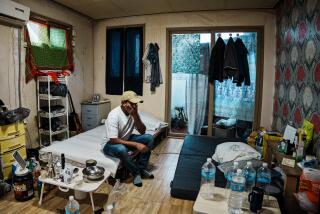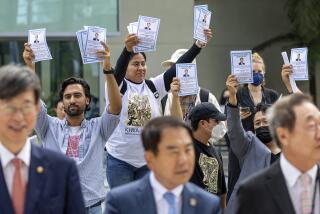S. Korean Builders Again Going Abroad : Construction: Overseas contracts have shrunk in recent years, but the former “golden goose” appears to be reviving.
- Share via
SEOUL — The overseas construction industry, once called South Korea’s “golden goose,” is gambling that new markets in Arab and communist nations will help it overcome a long slump.
South Korean contractors, unfazed by political and regional differences with their homeland, are looking at postwar reconstruction projects in Iran and Iraq, expanding business in Libya and starting projects in the Soviet Union and other socialist nations. They’re even considering a cooperative venture in Siberia that would employ workers from South Korea’s archenemy, communist North Korea.
“Finally, we seem to be coming out of a long tunnel of recession,” said Choi Jae-yol, a government economic researcher, referring to a surge in South Korean overseas construction.
In the past two decades, domestic contractors have won $90 billion in contracts overseas, earning foreign currency needed for South Korea’s economic development. But in recent years South Korea’s overseas construction declined severely.
Volume of contracts nose-dived from an all-time high of $13.7 billion in 1981 to $1.6 billion in 1988. Volume began to pick up last year, reaching $2.4 billion, and officials expect business in 1990 to top $7.7 billion, some of it in socialist and communist nations.
South Koreans are expanding their business from labor-intensive civil engineering to technology-oriented projects such as power plants, but they still rely heavily on cheap labor. South Korean contractors abroad hire help from Bangladesh, Thailand, the Philippines and other Third World Asian nations. At the end of 1989, 42,000 foreigners were on Korean payrolls abroad, compared to 24,000 Korean overseas construction workers.
The South Koreans are paid about $875 a month, while other foreign workers earn about a third of that, a price edge that the companies say is necessary for them to remain competitive.
Officials say Libya will emerge as South Korea’s largest market in 1990 with $5.7 billion in contracts, followed by Saudi Arabia with $820 million and Iran with $422 million.
Last September, Libya picked Dong-A Construction of Seoul as a prime contractor for a $5.3-billion water project. A formal contract for the project, the largest awarded to a South Korean firm, will be signed this year.
South Koreans previously received nearly 80% of their overseas contracts in the Middle East, but Saudi Arabia and other Arab nations scaled down development revenues as prices for their oil dropped.
Choi, who works for the government-controlled Overseas Construction Assn., said the recovery pace of South Korea’s overseas construction business depends partly on the ability to snare multibillion-dollar rehabilitation projects in Iran and Iraq.
South Korea is one of the few countries able to do business with both Iran and Iraq. During the eight-year Persian Gulf War, South Korea maneuvered to stay neutral between the two. Iran sought South Korean assistance in getting U.S.-made jet parts for its air force, but the Seoul government rejected the request, citing its neutral foreign policy. Iran retaliated by downgrading its ties with Seoul to a charge d’affairs but restored full ties with Seoul after the cease-fire.
South Korea’s rejection of Iran’s request helped it to open ties with Iraq, with which Seoul had no diplomatic relations. South Korea now maintains diplomatic relations with both Arab nations.
Kim Sung-jo, a director-general in the Construction Ministry, said South Korean business in the region will increase as the two Arab countries push rehabilitation projects.
Several South Korean companies have sent teams of experts to Tehran to inspect a major petrochemical project at Bandar Khomeini in southern Iran, abandoned by Japan’s Mitsui Corp. Iran officially asked South Korea to finish construction after the Japanese conglomerate decided the plant was too damaged by the war to be completed.
The Iranian project was 85% completed before the war in 1980 and was originally estimated in 1973 to cost $358 million. By 1981, the cost had ballooned to $4.48 billion. Government officials, who asked not to be identified, said Iran seeks a $3-billion loan from South Korea to complete construction.
South Korean companies are also pursuing projects in the Soviet Union and other socialist countries, with which their anti-communist government is improving relations. Seoul has established full diplomtic relations with Hungary, Poland, Yugoslavia and Algeria and, in the last 12 months, established the equivalent of consular ties with the Soviet Union.
The Daewoo Group, one of Korea’s largest conglomerates, is pushing hotel projects in Budapest and Moscow. Another conglomerate, Hyundai, recently signed a 30-year contract to develop forest land in eastern Siberia. With approval from Seoul, Hyundai plans to hire hundreds of North Koreans for work in Siberia.
More to Read
Inside the business of entertainment
The Wide Shot brings you news, analysis and insights on everything from streaming wars to production — and what it all means for the future.
You may occasionally receive promotional content from the Los Angeles Times.










